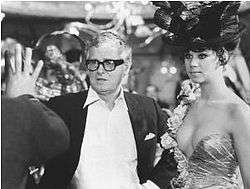Basil Dearden
Basil Dearden (born Basil Clive Dear;[1] 1 January 1911 – 23 March 1971) was an English film director.[2]
Basil Dearden | |
|---|---|
 | |
| Born | Basil Clive Dear 1 January 1911 Westcliff-on-Sea, Essex, England |
| Died | 23 March 1971 (aged 60) Hillingdon, London, England |
| Occupation | Film director |
| Years active | 1938–1970 |
| Spouse(s) | Margaret Ward (divorced) Melissa Stribling |
Life and career
Dearden was born at 5, Woodfield Road, Leigh-on-Sea, Essex to Charles James Dear, a steel manufacturer, and his wife, Florence née Tripp.[3]
Dearden graduated from theatre direction to film, working as an assistant to Basil Dean. He later changed his own name to Dearden to avoid confusion with his mentor.
He first began working as a director at Ealing Studios, co-directing comedy films with Will Hay, including The Goose Steps Out (1942) and My Learned Friend (1943). He worked on the influential chiller compendium Dead of Night (1945) and directed the linking narrative and the "Hearse Driver" segment. He also directed The Captive Heart starring Michael Redgrave, a 1946 British war drama, produced by Ealing Studios. The film was entered into the 1946 Cannes Film Festival. The Blue Lamp (1950), probably the most frequently shown of Dearden's Ealing films, is a police drama which first introduced audiences to PC George Dixon, later resurrected for the long-running Dixon of Dock Green television series. His last Ealing film, Out of the Clouds, was released in 1955.
In later years he became associated with the writer and producer Michael Relph, and the two men made films on subjects generally not tackled by British cinema in this era. These included homosexuality (Victim, 1961) and race relations (Pool of London, 1951; Sapphire, 1959). In the mid to late 1960s Dearden also made some big-scale epics including Khartoum (1966), with Charlton Heston and Laurence Olivier, and the Edwardian era black comedy The Assassination Bureau (1969), again with Michael Relph.
His last film was The Man Who Haunted Himself (1970) with Roger Moore, with whom he later made three episodes of the television series The Persuaders!: Overture, Powerswitch and To the Death, Baby.
He had two sons, Torquil Dearden and the screenwriter and director James Dearden.
Dearden died on 23 March 1971 at Hillingdon Hospital, London after being involved in a road accident on the M4 motorway near Heathrow Airport, in which he suffered multiple injuries.[4]
Reputation
The film critic David Thomson does not hold Dearden in high regard. He writes: "Dearden's films are decent, empty and plodding and his association with Michael Relph is a fair representative of the British preference for bureaucratic cinema. It stands for the underlining of obvious meaning".[5]
More positively, for Brian McFarlane, the Australian writer on film: "Dearden's films offer, among other rewards, a fascinating barometer of public taste at its most nearly consensual over three decades".[6]
Regular Ealing cinematographer Douglas Slocombe enjoyed working with Dearden personally, describing him as the 'most competent' of the directors he worked with at Ealing.[7]
Selected filmography
- This Man Is News (1938) (writer)
- Let George Do It! (1940) (writer)
- Spare a Copper (1941) (writer, producer)
- Turned Out Nice Again (1941) (writer, producer)
- The Black Sheep of Whitehall (1942) (co-director)
- The Goose Steps Out (1942) (co-director)
- The Bells Go Down (1943) (director)
- My Learned Friend (1943) (co-director)
- The Halfway House (1944) (director)
- They Came to a City (1945) (writer, director)
- Dead of Night (1945) (director, segments "Hearse Driver" and "Linking Narrative")
- The Captive Heart (1946) (director)
- Frieda (1947) (director)
- Saraband for Dead Lovers (1948) (director)
- Train of Events (1949) (writer, director; segments "The Actor" and "The Prisoner-of-War")
- The Blue Lamp (1950) (director)
- Cage of Gold (1950) (director)
- Pool of London (1951) (director)
- I Believe in You (1952) (writer, director)
- The Gentle Gunman (1952) (director)
- The Square Ring (1953) (director, producer)
- The Rainbow Jacket (1954) (director)
- Out of the Clouds (1955) (director)
- The Ship That Died of Shame (1955) (writer, director, producer)
- Who Done It? (1956) (director, producer)
- The Smallest Show on Earth (1957) (director)
- Rockets Galore! (1957) (producer)
- Davy (1957) (producer)
- Violent Playground (1958) (director)
- Desert Mice (1959) (producer)
- Sapphire (1959) (director)
- The League of Gentlemen (1960) (director)
- Man in the Moon (1960) (writer, director)
- Victim (1961) (director, producer)
- The Secret Partner (1961) (director)
- All Night Long (1961) (director, producer)
- Life for Ruth (1962) (director, producer)
- A Place to Go (1963) (director)
- The Mind Benders (1963) (director)
- Woman of Straw (1964) (director)
- Masquerade (1965) (director)
- Khartoum (1966) (director)
- Only When I Larf (1968) (director)
- The Assassination Bureau (1969) (director)
- The Man Who Haunted Himself (1970) (writer, director)
References
- "Basil Dearden". BFI. Archived from the original on 22 October 2012. Retrieved 29 September 2010.
- "Only When I Larf". Variety. 31 December 1967. Retrieved 22 February 2014.
- Class: RG14; Piece: 10121; Schedule Number: 79, Census Returns of England and Wales, 1911. The National Archives of the UK.
- Burton, Alan; O'Sullivan, Tim (2009). The Cinema of Basil Dearden and Michael Relph. Edinburgh University Press Ltd. p. xvii. ISBN 978 0 7486 3289 3. Retrieved 14 February 2015.
- David Thomson The New Biographical Dictionary of Film, London: Little, Brown, 2002, p.213
- Brian McFarlane (ed.) The Encyclopedia of British Film, 2003, London: Methuen/BFI, p.168
- Alan Burton; Tim O'Sullivan (2009). The Cinema of Basil Dearden and Michael Relph. Edinburgh University Press. p. 9. ISBN 978-0-7486-3289-3.